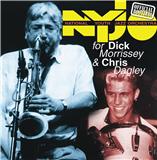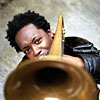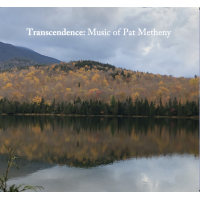Home » Jazz Articles » Big Band Caravan » Ray Brown's Great Big Band / NYJO / Marcus Shelby Jazz Orchestra
Ray Brown's Great Big Band / NYJO / Marcus Shelby Jazz Orchestra
 Ray Brown's Great Big Band
Ray Brown's Great Big BandKayak
Brown Cats Productions
2010
Sixteen years have passed since Ray Brown's Great Big Band (love that name!) recorded Impressions of Point Lobos, one of the stellar albums of 1994. Brown has ended that prolonged hiatus with Kayak, which should brighten many a listener's catalog of Top Ten albums for 2010-11. Whether the emphasis is on great or big, Brown's California-based band proves time and again that neither avenue is imprecise. The sound is big when it needs to be, the ensemble great—individually and collectively—on every chart (all of which are Brown's).
It's always a pleasure to reconnect with alto saxophonist Mary Fettig who solos tastefully on the first two numbers, Cole Porter's "So in Love" and Victor Herbert's "Indian Summer," the last with Ray Brown's guitar-playing brother, Steve (who co-arranged the tune). Steve Brown is front and center again on

Kenny Wheeler
flugelhorn1930 - 2014

Frank Rosolino
trombone1926 - 1978
Mendenhall commands the spotlight on

Bill Evans
piano1929 - 1980

John Coltrane
saxophone1926 - 1967

Miles Davis
trumpet1926 - 1991

Victor Feldman
multi-instrumentalist1934 - 1987
Sailing aboard this Kayak is an invariably rewarding experience. Thanks to Ray Brown for shepherding the Great Big Band into a studio, but please don't make everyone wait another sixteen years before recording again.
 National Youth Jazz Orchestra
National Youth Jazz OrchestraFor Dick Morrissey and Chris Dagley
Stanza Records
2010
Sometimes even the most heartfelt tributes spring forth as much by chance as by design. Great Britain's superb National Youth Jazz Orchestra (NYJO), wishing to honor tenor saxophonist

Dick Morrissey
saxophoneb.1940
Even though the concert was preserved from the back of the hall on a Walkman recorder, and its provenance is clear in the sometimes boxy and less-than-burnished sound, the power and precision of NYJO come shining through on every number, as do the passion and energy of its irrepressible foreman, the 19-year-old Chris Dagley. As for Morrissey, he brings his special talent to the fore on seven of eleven numbers starting with Alan Hare's buoyant "Afterburner." Hare also wrote the groovy "Lift Off" and arranged the standard "Tangerine," each of which embodies one of Morrissey's no-nonsense manifestos, as do the late Harry South's turbulent "Storm Warning" and majestic "Royal Flush" (saxophones and rhythm only), Paul Higgs' succulent "Syrup of Phiggs" and Chris Smith's rapid-fire finale, "Going Dutch" (which fades during Morrissey's impassioned solo). Rounding out the concert are Smith's easygoing"Yessica" (showcasing a young Lisa Grahame on flute) and appetizing "Cheese & Carrots," Higgs' intense "Water Babies" and

Mark Nightingale
tromboneb.1967
Mention should be made of NYJO's other soloists, as each of them is splendid. Tenors Howard McGill and Adam Talbot skirmish on "S'wonderfuel," while Morrissey spars with Talbot on "Going Dutch" and trombonists

Dennis Rollins
tromboneb.1964

Martin Shaw
trumpetb.1966
As the emphatic applause suggests, this is another electrifying concert by NYJO, one well worth revisiting even aside from its admirable purpose. Morrissey and Dagley are smashing, while the ensemble as a whole earnestly keeps pace. As if that weren't enough reason to consider the album, proceeds from its sale are earmarked for Dagley's partner, Jan, and their three children. For Dick and Chris is available from Stanza Records.
 Marcus Shelby Orchestra
Marcus Shelby OrchestraSoul of the Movement
Porto Franco Records
2010
Multi-talented

Marcus Shelby
bassAs always, Shelby doesn't let a little thing like disparate genres impede his forward motion. On Soul, he draws together well-known hymns, classic spirituals, a civil rights anthem ("We Shall Overcome"), political broadside (

Charles Mingus
bass, acoustic1922 - 1979

Curtis Mayfield
guitar and vocals1942 - 1999
Washington, Carol and Anderson are heard, singly or together, on seven of the album's dozen selections (four of Shelby's compositions and "Fables of Faubus" are instrumentals). The ensemble boasts a number of engaging soloists, among whom the most frequently heard are tenors Evan Francis and Sheldon Brown, alto Gabe Eaton, trumpeters Mike Olmos and Darren Johnston. Howard Wiley fashions emphatic statements on soprano ("Memphis") and tenor ("Take My Hand Precious Lord"). Shelby, pianists Adam Shulman or Sista Kee, organist Matt Clark and drummer Jeff Marrs comprise a robust and tight-knit rhythm section.
As is true of almost any such far-reaching endeavor, there are moments of uncommon beauty and persuasive interest, others that are more prosaic. The cumulative effect, however, is momentous and invigorating. Once again, Shelby has pressed home his thesis and achieved his purpose, and has done so by entertaining rather than preaching. The result is a big band album that embodies a substantive message but can easily rest on its own merits.
U.S. Naval Academy Next Wave Jazz Ensemble
. . . just gettin' started . . .
USNA
2010
As its debut album affirms, not only does the U.S. Naval Academy in Annapolis have a jazz ensemble, it has a very good one indeed. It helps greatly, of course, to have as proficient a sideman as Joe McCarthy, co-leader of the splendid Vince Norman / Joe McCarthy Big Band, sitting in on drums, and tenor saxophonist Luis Hernandez, a mainstay with the U.S. Navy Commodores, enhancing the reed section. Hernandez makes his presence known immediately, soloing adeptly on the opening numbers, Dan Cavanagh's "Split Rock" and

Chris Potter
saxophone, tenorb.1971
Besides those already mentioned, the band unravels the Cavanagh originals "Phase Space" and "Gozar,"

Pat Metheny
guitarb.1954

Lyle Mays
keyboards1953 - 2020

Tadd Dameron
piano1917 - 1965
Hernandez, Samuels and Wright are engaging soloists, as are alto Cam Collins ("First Circle," "Hothouse"), trumpeter Matt Shea ("Phase Space," "Extra Credit," "Hothouse"), trombonist Russell Sharp ("Gozar"), baritone Colin Renick and trombonist / unit leader Dan Drew ("Extra Credit"). McCarthy's bravura percussion sets the scene on "Gozar," while he, Wright and bassist James Fowler comprise a taut and responsive rhythm section whose support never wavers (note, for example, Fowler's resonant bass lines and McCarthy's tasteful timekeeping on "Hot House").
In sum, an auspicious and pleasing maiden voyage for the U,.S. Naval Academy Band, one that augurs well for cruises yet to come.
Mt. Hood Jazz Band & Combos
Gan Bei
Sea Breeze Vista
2010
Gan Bei is the seventh album in as many years by director Susie Jones' self-assured Jazz Band from Mt. Hood Community College in Gresham, Oregon, which this time around shares blowing space with two smaller combos, Nos. 2138 and 2102 (no word anywhere as to the reasons for the numbers). Combo 2138 excels on the boppish opener, tenor saxophonist Leon Cotter's "Song for the Chairman," and on pianist Shawn Schlogel's rhythmic "Time Keeps Movin' On," while combo 2102 is in the pocket on guitarist Steve Lillegard's even-tempered "Make Me Feel So Blue" (sensuous vocal by Susan Sinclair).
The large ensemble takes command on the other eight tracks, which include animated originals by Alan Baylock ("Hullabaloo," "Livin' Larger Than Life"), Baylock's clever arrangement of Ray Noble's jazz evergreen, "Cherokee," Allan Horney's well-grooved "J Bird Rides Again," John Clayton's greasy "Soupbone,"

Ray Charles
piano and vocals1930 - 2004
As is the case with the combo numbers, the origin of Gan Bei is unexplained, but that's beside the point. What's important is that the MHCC Band (and combos) perform well throughout, producing yet another album of tasteful big band jazz that is well above the norm. If past performance is a credible signpost, 2011 should give rise to more of the same.
Tracks and Personnel
Kayak
Tracks: So in Love; Indian Summer; Kayak; I Fall in Love Too Easily; Blue Daniel; Del Sasser; Our Love Is Here to Stay; I've Never Been in Love Before; Turn Out the Stars; Tricotism; Moment's Notice; Song of No Regrets; Seven Steps to Heaven.
Personnel: Ray Brown: leader, arranger; Rich Bice: trumpet; Steve Campos: trumpet; Don Beck: trumpet; Louis Fasman: trumpet; Erik Jekobsen: trumpet; Mary Fettig: alto sax, flute, alto flute; Paul Contos: alto sax, flute; Paul Tarantino: tenor sax (1-5, 13); Bennett Friedman: tenor sax, clarinet (6-12); Charlie McCarthy: tenor sax, clarinet; Mike Young: baritone sax, bass clarinet; John Gove: trombone; Dave Eshelman: trombone; Dave Gregoric: trombone; Dave Martell: trombone; Derek James: bass trombone (1-5, 13); Steve Barnhill: bass trombone (6-12); Steve Brown: guitar; Eddie Mendenhall: piano; John Shifflett: bass; Steve Houghton: drums; Gail Dobson: vocal (8).
For Dick Morrissey and Chris Dagley
Tracks: S'Wonderfuel; The Water Babies; Yessica; Afterburner; Syrup of Phiggs; Cheese & Carrots; Storm Warning; Tangerine; Royal Flush; Lift Off; Going Dutch.
Soul of the Movement
Tracks: There Is a Balm in Gilead; Amen; Emmett Till; Black Cab; Fables of Faubus; We Shall Overcome; Trouble on the Bus; Birmingham; Go Tell It on the Mountain; We're a Winner; Memphis; Take My Hand Precious Lord.
Personnel: Marcus Shelby: leader, conductor, composer, arranger, bass; Louis Fasman: trumpet; Scott Englebright: trumpet; Mike Olmos: trumpet; Darren Johnston: trumpet; Mark Wright: trumpet; Gabe Eaton: alto sax; Marcus Stephens: alto sax; Sheldon Brown: tenor sax, clarinet; Evan Francis: tenor sax, flute; Howard Wiley: tenor, soprano sax; Fil Lorenz: baritone sax; Joel Behrman: trombone; Rob Ewing: trombone; Mike Rinta: trombone; Adam Shulman: piano; Sista Kee: piano; Matt Clark: B3 organ; Jeff Marrs: drums, percussion, vocals; Faye Carol: vocals; Jeannine Anderson: vocals; Kenny Washington: vocals.
. . . just gettin' started . . .
Tracks: Split Rock; Seven Eleven; Easy to Love; The First Circle; Phase Space; Blue; Extra Credit; Leaving; Gozar; Hot House.
Personnel: Brian O. Walden: director; Ken Pfabe: trumpet; Matt Shea: trumpet; Geoff Bayne: trumpet; Davey DeArmond: trumpet; Cam Collins, Joe Tubiolo, Luis Hernandez, James Rodak, Colin Renick: woodwinds; Dan Drew: trombone; Russell Sharp: trombone; Clint Woltering: trombone; Zac Hollister: trombone; J.J. Wright: piano, Fender Rhodes; James Fowler: bass; Joe McCarthy: drums, shekere, congas, bongos; Jessica Hatfield: vocals. Guest artists: Blake Cramer: vibraphone (3, 4); Ben Bokor: woodwinds (4, 10); Dave Samuels: vibraphone (6); Nick Pastelak: percussion (4).
Gan Bei
Tracks: Song for the Chairman; Cherokee; Hullabaloo; Count Me In; Time Keeps Movin' On; Invitation; The "J" Bird Rides Again; Livin' Larger Than Life; Make Me Feel So Blue; Soupbone; What'd I Say.
Personnel: Jazz Band: Susie Jones: director; Kevin Ohmart: trumpet; Nick Nera: trumpet; J.R. O'Brien: trumpet; Nic Castaneda: trumpet; David Miller: trumpet; Ryan Carlson: alto sax; Jared Caranto: alto sax; Sam Solano: tenor sax; Chris Meyer: tenor sax; Abi Mitschele: baritone sax; J.J. Meyer: trombone; Yuki Inouye: trombone; Mitch Saint Germain: trombone; Scott Evensen: bass trombone; Manny Chester: piano; Alex Weinberg: guitar; Bryon Fanger: bass; James Travers: drums; Matt Farina: drums; Curtis Salgado: vocal (11). Combo 2138: Leon Cotter: tenor sax; Kevin Ohmart: trumpet; Shawn Schlogel: piano; Shyam Ananda: guitar; Bryon Fanger: bass; Matt Farina: drums. Combo 2102: Mitch Saint Germain: trumpet, trombone; J.R. O'Brien: trumpet; Jared Caranto: alto sax; Susan Sinclair: violin, vocals; Dan Gonzales: guitar, piano; Steve Lillegard: guitar, piano; Corbin Wescott: bass; James Travers: drums.
Tags
Comments
PREVIOUS / NEXT
Support All About Jazz
 All About Jazz has been a pillar of jazz since 1995, championing it as an art form and, more importantly, supporting the musicians who make it. Our enduring commitment has made "AAJ" one of the most culturally important websites of its kind, read by hundreds of thousands of fans, musicians and industry figures every month.
All About Jazz has been a pillar of jazz since 1995, championing it as an art form and, more importantly, supporting the musicians who make it. Our enduring commitment has made "AAJ" one of the most culturally important websites of its kind, read by hundreds of thousands of fans, musicians and industry figures every month.




 Buy Now
Buy Now

















